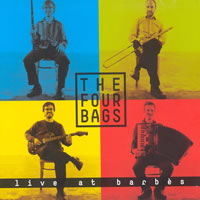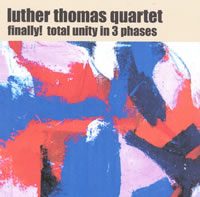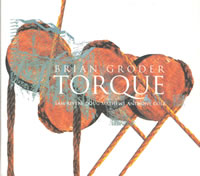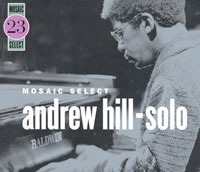Moment's Notice
Recent CDs Briefly Reviewed
(continued)
The Four Bags
Live At Barbès
NCM East NCM40127
 On Live At Barbès, The Four Bags create a rough synthesis of two influential approaches to humor in jazz-related composition, those of Willem Breuker and of the Microscopic Septet’s Joel Forrester and Philip Johnston. Brueker’s premise is that “legitimate” music and musicianship is inherently funny. Though Brueker’s humor tends to be regarded as broad, his writing has a straight face most of the time. The Micro’s is that mid-century pop culture set askew makes for sure-fire laughs, and that embedding a wink, if not a grin into the writing makes the sale. Since trombonist Brian Drye, accordionist Jacob Garchik, electric guitarist Sean Moran and reed player Michael McGinnis all contribute contrasting pieces to the album, their composite approach is somewhat resistant to generalizations. Johnston’s approach of cramming everything he can into a tune is very much in evidence on McGinnis’ “Tent Song,” a fast-paced cavalcade of pastiche, while Moran’s “The Fall” has something of Brueker’s droll approach to tango. But, by virtue of being an oddly configured quartet, The Four Bags have an elasticity of interplay, which often aids their comic timing. There are also shifting cultural undercurrents, signaled by American maverick guitar, Old World accordion and shuttling clarinet and trombone. All four musicians draw upon multiple idioms, sometimes in the same piece. Moran is particularly deft at making rock and skronk-derived asides in the small spaces built into their arrangements of such oddities as an old Luis Gonzaga tunes and a Schoenberg lieder. However, The Four Bags is not a two-dimensional joke band. When they get serious, the resulting music can be poignant, which is the case with McGiniss’ hushed “Iowa Requiem” and tender “Valley Song,” while Drye’s “OK James” cogently conveys ambivalence. This seems to indicate that the quartet has learned the most profound lesson that can be gleaned from Brueker, who has penned such pain-riddled works as Hunger and Thirst: if you can make them laugh, you’ll be able to choke them up, too. The Four Bags play both ends of the street very well.
On Live At Barbès, The Four Bags create a rough synthesis of two influential approaches to humor in jazz-related composition, those of Willem Breuker and of the Microscopic Septet’s Joel Forrester and Philip Johnston. Brueker’s premise is that “legitimate” music and musicianship is inherently funny. Though Brueker’s humor tends to be regarded as broad, his writing has a straight face most of the time. The Micro’s is that mid-century pop culture set askew makes for sure-fire laughs, and that embedding a wink, if not a grin into the writing makes the sale. Since trombonist Brian Drye, accordionist Jacob Garchik, electric guitarist Sean Moran and reed player Michael McGinnis all contribute contrasting pieces to the album, their composite approach is somewhat resistant to generalizations. Johnston’s approach of cramming everything he can into a tune is very much in evidence on McGinnis’ “Tent Song,” a fast-paced cavalcade of pastiche, while Moran’s “The Fall” has something of Brueker’s droll approach to tango. But, by virtue of being an oddly configured quartet, The Four Bags have an elasticity of interplay, which often aids their comic timing. There are also shifting cultural undercurrents, signaled by American maverick guitar, Old World accordion and shuttling clarinet and trombone. All four musicians draw upon multiple idioms, sometimes in the same piece. Moran is particularly deft at making rock and skronk-derived asides in the small spaces built into their arrangements of such oddities as an old Luis Gonzaga tunes and a Schoenberg lieder. However, The Four Bags is not a two-dimensional joke band. When they get serious, the resulting music can be poignant, which is the case with McGiniss’ hushed “Iowa Requiem” and tender “Valley Song,” while Drye’s “OK James” cogently conveys ambivalence. This seems to indicate that the quartet has learned the most profound lesson that can be gleaned from Brueker, who has penned such pain-riddled works as Hunger and Thirst: if you can make them laugh, you’ll be able to choke them up, too. The Four Bags play both ends of the street very well.
Joel Futterman
Possibilities
Ayler aylDL-011
Frode Gjerstad Trio
The Other Side
Ayler aylDL-019
Sonny Simmons Trio
Live At Knitting Factory
Ayler aylDL-023
Steve Swell’s Nation Of We
Live At The Bowery Poetry Club
Ayler aylDL-005
Luther Thomas Quartet
Finally! Total Unity In 3 Phases
Ayler aylDL-041
 Ayler Records’ Download Only series represents one of two emergent trends in the marketing of improvised music, the other being tour-driven micro editions like Eremite’s release of Brotzmann/Bennink’s 1977 Total Music Meeting performance and Evan Parker and Ned Rothenberg’s 2000 Empty Bottle gig on Animul. In addition to the implicit now-or-never leverage the tour CD can wield, the edge such titles have over generic downloads is their weight as objects, something that can be collected and, presumably, coveted in the future. Ayler’s approach allows consumers to objectify the download by burning a CD-R and then casing it with the downloadable album covers, liner notes and CD label that comport to the design of Ayler’s hard-copy titles.
Ayler Records’ Download Only series represents one of two emergent trends in the marketing of improvised music, the other being tour-driven micro editions like Eremite’s release of Brotzmann/Bennink’s 1977 Total Music Meeting performance and Evan Parker and Ned Rothenberg’s 2000 Empty Bottle gig on Animul. In addition to the implicit now-or-never leverage the tour CD can wield, the edge such titles have over generic downloads is their weight as objects, something that can be collected and, presumably, coveted in the future. Ayler’s approach allows consumers to objectify the download by burning a CD-R and then casing it with the downloadable album covers, liner notes and CD label that comport to the design of Ayler’s hard-copy titles.
These five titles inaugurate Ayler’s series in impressive fashion. In a market where downloads threaten to further flood the market, they do not dilute Ayler’s finished CD catalog. They comprise a revealing composite snapshot of what’s happening Stateside. Recorded in Chicago, alto saxophonist Frode Gjerstad’s The Other Side, a briskly paced trio date bassist William Parker and drummer Hamid Drake, is a solid indicator of how an increasing number of international summits are occurring on this side of the pond. Conversely, the debut of trombonist Steve Swell’s mighty, 15-piece Nation of We is a different type of reality check; a lot of great projects still perform only in New York.
The remaining three titles are led by iconoclasts who have languished in obscurity for far too long. Fortunately, alto saxophonist Sonny Simmons has earn elder eminence in the past decade; his notoriety will be reinforced by this frequently vamp-driven trio date with bassist Cameron Brown and drummer Ronnie Barrage, recorded during the 2001 Vision Festival. For the most part, pianist Joel Footman’s solo album places his post-Taylor mix of dexterity and power out front. But, Futterman also repeatedly proclaims an affinity for Ellington and Monk by plying bluesy chords and flourishes onto a stomping bass figure, or hinging a solo with a phrase that teeters on the brink of irresolution.
Though these four albums add something substantial to the leaders’ respective discographies, it is Luther Thomas’ Finally! Total Unity in 3 Phases that is the potential major statement of the lot. For anyone who only associates the alto saxophonist through discs like Funky Donkey and groups like Human Arts Ensemble, the music of this unusually configured quartet will be nothing less than startling. In quieter moments, the industrial surrealism hark back to Thomas’ BAG colleague Julius Hemphill’s Roi Boye and the Gotham Minstrels, but when they ramp up the intensity, resulting music is withering. At every turn, Jeffrey Hayden Shurdut (guitar, drums), Motoko Shimiizu (toys, recorder and voice) and Ed Chang (computer, reeds) simply set Thomas off. He plays almost continuously from beginning to end, bobbing and weaving through ever-shifting textures, yet always maintaining an exultant sound steeped in the African-American continuum. Finally! is an object lesson in genre-bending improvisation.
Brian Groder
Torque
Latham 5105-2
 It’s one thing to engage a great artist like Sam Rivers for a recording, and even bring on his longstanding trio with bassist Doug Mathews and drummer Anthony Cole. But, it something far rarer to produce an album that places such a giant in a different, distinctive light the way Brian Groder does on Torque. The trumpeter/flugelhorn player takes the octogenarian multi-instrumentalist out of his usual practice of briskly rotating through several configuration in the course of a set – everything from a conventional horn-bass-drums line-up to horn trios. Instead, Groder sticks with a straight-up, two-horn quartet for most of the album, sifting in duets with Rivers and Mathews at key points in the proceedings. Employing roughly equal portions of boldly contoured themes and the spontaneous invention for which Rivers is renowned, Groder gives the listener a different vantage on how Rivers applies the unique lexicon he has refined over the decades. Groder composed approximately 2/3 of the album’s 14 tracks (the others are credited to the musicians improvising on the respective tracks), all of which have interesting beads on various aspects of Rivers’ odyssey through the music. Groder has a great sense of how to play to Rivers when they improvise together, with or without Mathews and Cole. He expertly rides in Rivers draft, which is not easy, given Rivers’ propensity to suddenly leap out of the pocket, and either cut against the established rhythmic grain, or let his phrases spiral outward, before an equally sudden and obliquely angled return. In the process, Groder’s engaging methods of combining line, texture and attack spur on Rivers at every turn. Their chemistry catalyzes this exceptional recording.
It’s one thing to engage a great artist like Sam Rivers for a recording, and even bring on his longstanding trio with bassist Doug Mathews and drummer Anthony Cole. But, it something far rarer to produce an album that places such a giant in a different, distinctive light the way Brian Groder does on Torque. The trumpeter/flugelhorn player takes the octogenarian multi-instrumentalist out of his usual practice of briskly rotating through several configuration in the course of a set – everything from a conventional horn-bass-drums line-up to horn trios. Instead, Groder sticks with a straight-up, two-horn quartet for most of the album, sifting in duets with Rivers and Mathews at key points in the proceedings. Employing roughly equal portions of boldly contoured themes and the spontaneous invention for which Rivers is renowned, Groder gives the listener a different vantage on how Rivers applies the unique lexicon he has refined over the decades. Groder composed approximately 2/3 of the album’s 14 tracks (the others are credited to the musicians improvising on the respective tracks), all of which have interesting beads on various aspects of Rivers’ odyssey through the music. Groder has a great sense of how to play to Rivers when they improvise together, with or without Mathews and Cole. He expertly rides in Rivers draft, which is not easy, given Rivers’ propensity to suddenly leap out of the pocket, and either cut against the established rhythmic grain, or let his phrases spiral outward, before an equally sudden and obliquely angled return. In the process, Groder’s engaging methods of combining line, texture and attack spur on Rivers at every turn. Their chemistry catalyzes this exceptional recording.
Andrew Hill
Andrew Hill – Solo
Mosaic Select 23
 Though it is generally known that Andrew Hill left New York in the mid 1970s for California, it is far less frequently reported that he was motivated by the ill health of his late first wife, Laverne, after whom he titled a poignant early composition. It would therefore be expectable that his music from this period, particularly in a setting as intimate as solo piano, would be rife with tumultuous currents. Yet, the one solo album Hill recorded in California – From California With Love (Artists House) (for a more detailed account of this album, see The Circle … in Issue #4) – was bucolic compared to the bulk of his prior recordings. The album’s two side-long performances were expansive, even diaphanous at times, an immediately discernable divergence from the tone of Hill’s two earlier solo albums, Live In Montreux (Arista/Freedom) and Hommage (East Wind).
Though it is generally known that Andrew Hill left New York in the mid 1970s for California, it is far less frequently reported that he was motivated by the ill health of his late first wife, Laverne, after whom he titled a poignant early composition. It would therefore be expectable that his music from this period, particularly in a setting as intimate as solo piano, would be rife with tumultuous currents. Yet, the one solo album Hill recorded in California – From California With Love (Artists House) (for a more detailed account of this album, see The Circle … in Issue #4) – was bucolic compared to the bulk of his prior recordings. The album’s two side-long performances were expansive, even diaphanous at times, an immediately discernable divergence from the tone of Hill’s two earlier solo albums, Live In Montreux (Arista/Freedom) and Hommage (East Wind).
The discovery of more than two hours of music of Hill playing solo at any time in his career is a major find. But, these recently unearthed solos from the 1978 Berkeley sessions that yielded From … flesh out what previously seemed to an anomalous utterance on Hill’s part, placing the album in a fuller context. The ruminative delivery and warm glow of “California With Love” and “Reverend Du Bop” is present on the nine Hill originals and two standards issued here for the first time. When heard together in this 3-CD set, it is staggering how Hill sustained a very specific emotional keel over the course of six weeks, crossing calm waters with an eye on the storms looming on the horizons.
These gem-like performances constitute the closest thing to a diary of Hill’s creative process that has been released to date. It’s as if after each session, Hill mulled over the results, and let them seep in his approach for the next. Materials explored in one session crop up in the next, while dramatic devices like sudden rhapsodic crescendos, and jabbed chords that free fall into silence, are reworked into different compositions with finely adjusted results. Such qualities underscore two other, somewhat related factors are notable. Only three of the 14 tracks clock in less than seven minutes and two are the standards “Gone With The Wind” and “I Remember Clifford.” And, the formal qualities of most of these performances unfold in real time, a marked contrast to his compacted classic Blue Notes.
However, the truly profound aspect of these recordings is how Andrew Hill dealt with adversity through his music. It is inspiring.
